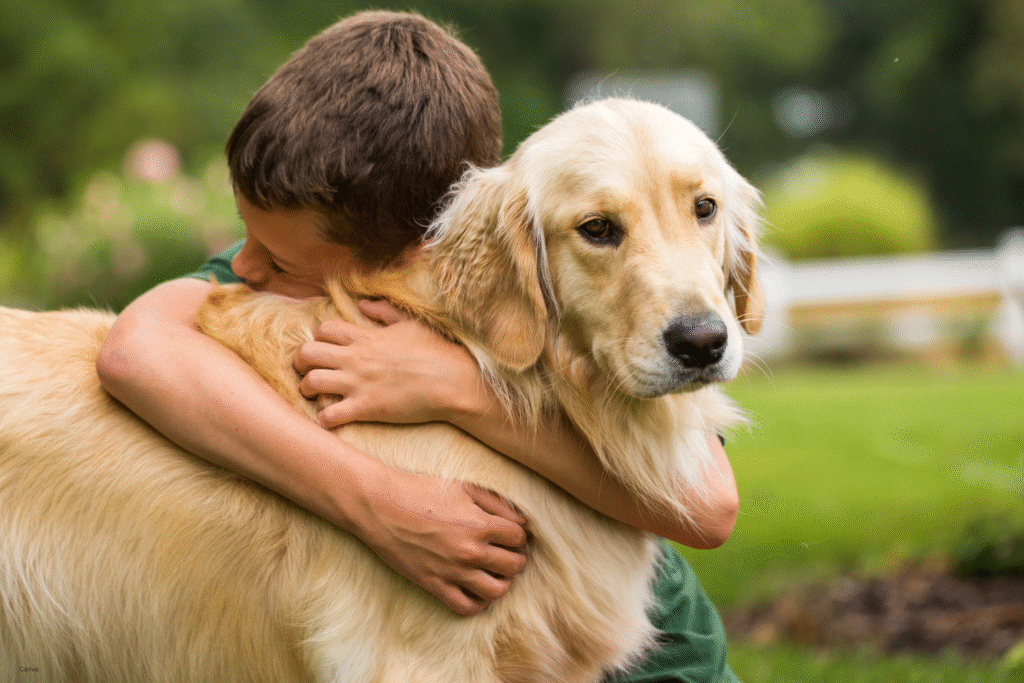Their perfect family reputation has cracks you rarely hear about.

Golden Retrievers get love everywhere. They look friendly, act friendly, and often seem like they were designed to live with families. Yet owning one is not as simple as buying tennis balls and snapping cute photos. They come with quirks, needs, and challenges that many families do not expect until they are knee-deep in fur and training schedules. The truth is far more nuanced than “perfect dog for everyone.”
1. Patience with kids goes beyond expectation.

As stated by the American Kennel Club, Golden Retrievers have an innate ability to tolerate chaos from children that would send other breeds running. Their even temper and calm nature make them remarkably safe around unpredictable little humans.
Families often describe them as more like older siblings than pets, quietly enduring loud games and constant attention. That said, it is not magic—it requires socialization and patience from owners. Their natural gentleness does not erase the need for training to ensure safe interactions between kids and dogs.
2. High intelligence can work against you.

According to research reported by Canine Journal, Golden Retrievers rank among the top smartest dog breeds. That intelligence helps them learn commands fast but also makes them prone to boredom-fueled mischief if under-stimulated.
A bored Golden is a destructive Golden. They may chew furniture, counter-surf, or dig up an entire backyard looking for entertainment. Owners quickly realize daily mental stimulation is as important as physical exercise. Without it, these sweet dogs transform into home renovation projects with teeth.
3. Shedding is a lifestyle adjustment, not a seasonal event.

As discovered by PetMD, Golden Retrievers shed constantly, with seasonal “blowouts” twice a year when hair loss reaches absurd levels. Their double coats are beautiful but unforgiving to furniture, clothing, and anyone with allergies.
Vacuuming becomes part of daily life, and grooming appointments are non-negotiable. Many new owners assume the fur will be manageable, only to realize their home now resembles a snow globe year-round. Investing in grooming tools and lint rollers is simply part of the deal.
4. Their social nature demands constant companionship.

Golden Retrievers are people-focused to a fault. They crave interaction, affection, and being included in everything. Left alone for long periods, they often develop separation anxiety and destructive coping behaviors like chewing or incessant barking.
This breed works best for households where someone is usually home or where dogs can accompany owners on errands and trips. They thrive on love and attention, but that same neediness becomes a challenge for busy families or those who work long hours away from home.
5. Exercise needs rival some working breeds.

While they look relaxed, Golden Retrievers require significant daily exercise to stay balanced. A quick stroll around the block rarely cuts it. They need long walks, playtime, and often advanced outlets like agility, running, or swimming.
Skipping exercise does not just make them restless—it can lead to anxiety, destructive behaviors, and even weight gain. Families looking for a couch companion often discover they accidentally signed up for a canine athlete with endless stamina. Meeting those needs can mean reorganizing schedules, finding new hobbies, and committing to a more active lifestyle than originally planned.
6. Health issues show up more often than you expect.

Goldens are prone to hip dysplasia, heart problems, and certain cancers at rates higher than many breeds. These risks mean frequent vet visits, insurance considerations, and sometimes painful decisions about treatment options.
Their popularity has unfortunately fueled overbreeding, which increases inherited health issues. Families must be prepared for the emotional and financial aspects of long-term health care, even though the dog’s personality feels like it could never come with that kind of burden. For many owners, the emotional bond often outweighs the cost, but it is a heavy reality that surprises people who expected a “low-maintenance” family pet.
7. They can overwhelm first-time dog owners.

Golden Retrievers are often marketed as perfect beginner dogs, but their exercise needs, shedding, and emotional demands can surprise first-time owners. Many underestimate how much daily effort goes into raising a well-behaved, balanced Golden.
Without experience or commitment, people sometimes become frustrated, leading to training issues or even rehoming. This is a breed that rewards commitment but punishes inconsistency or neglect in ways new owners often are not prepared for. The initial honeymoon phase wears off quickly if a family is not truly ready to invest time and energy every single day.
8. Their friendliness is not always practical.

Goldens tend to love everyone, including strangers, delivery drivers, and even intruders. While this makes them great family pets, it also means they are terrible guard dogs.
Families expecting any level of protection often find their Golden wagging its tail at potential threats instead. Their trust and openness are wonderful in social settings but not ideal if your goal is to have a watchful or protective companion. This level of friendliness works beautifully for social households but can feel frustrating for people who need a more cautious or territorial breed.
9. Training is easy but never-ending.

They learn commands fast, but their intelligence and enthusiasm require ongoing engagement. Owners who stop training often see regressions or the development of bad habits like jumping, begging, or leash pulling.
Consistent reinforcement and new challenges keep them sharp and well-mannered. Families who enjoy interactive play and ongoing training find joy in it, while others might feel frustrated that “easy to train” does not mean “train once and done.” If training feels like work instead of bonding, this breed can quickly feel like a full-time job.
10. They age with unique emotional needs.

Senior Golden Retrievers often become more emotionally dependent, seeking comfort and attention as health issues creep in. Their attachment deepens, and they sometimes develop anxiety when routines change.
Families must be ready to adjust care, diet, and exercise routines as their Golden transitions into old age. The payoff is a bond that feels deeper than ever, but the emotional and practical commitment only grows with time. For many, this means planning ahead financially and emotionally to ensure their loyal companion gets the best care possible in their later years.
